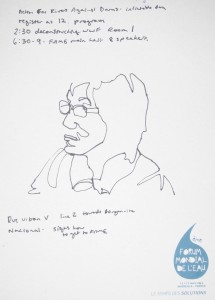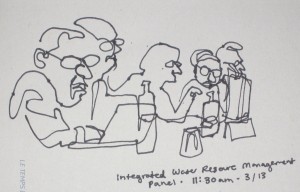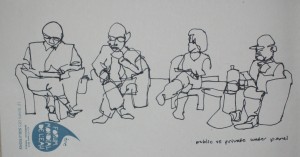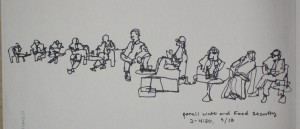-Lisa Bjerke & Ken Cline
Past World Water Forums have reverberated with NGO and youth calls for the recognition of water as a human right. After years of campaigning the UN General Assembly declared safe, clean drinking water and sanitation a human right “essential to the full enjoyment of life and all other human rights” on July 28, 2010. UNGA Resolution A/RES/64/292.
We thought this World Water Forum would be different—we weren’t going to fight about the existence of a right. We could now get down to the important business of arguing about how to implement the right and make it real. The program for the forum enticed with workshops like “Implementing the Human Right to Safe Drinking Water.” So, imagine our surprise when we heard Catarina de Albuquerque, the UN Special Rapporteur on the Human Right to Safe Drinking Water and Sanitation, say that the ministerial statement from the forum was going to undermine the UN General Assembly Declaration and backtrack on the human right guarantee.
Ministerial statements from World Water Forums are interesting beasts. Unlike most UN-sponsored negotiations, the ministers at the WWF feel no obligation to conduct their negotiations in public view. In fact, when we got an excited announcement that the ministerial draft was almost complete prior to the forum, we naively wrote and requested a copy. We were politely informed that the draft was not public and we could not obtain a copy. Obviously for good reason.
It appears that that the US, Canada, and their corporate allies were not happy with the UN recognition of the Right to Water (the US abstained on the General Assembly vote.) So in the ministerial text they have insisted on a slight change in language that steps away from the UN recognized right to water. The language shift is subtle but powerful. Words matter. They especially matter in international legal texts (even soft and squishy ones).
Although the ministerial statement actually recognizes the UN Resolution, it doesn’t adopt or incorporate the human right obligations declared by the UN. Instead it gives a broad general recognition of generic human rights around water. In practice, the specifically recognized “Human Right to Water and Sanitation” is different from a general protection of human rights to water. This is especially important in the case of a right(s) violation. The distinction is similar to that between the general statement that your civil rights have been violated and a statement that your 1st Amendment Right to Free Speech was violated. The right to water and sanitation should be as clear and defensible as the right to free speech. If water and sanitation are generally included in an undefined set of human rights (plural), then water and sanitation will not have their own legal status. This could mean that water is treated as a privatized good, and that human rights can be viewed as needs: needs satisfied by large corporations selling water to meet a market demand.
One might think that the extra “s” was simply an oversight or sloppy drafting (perhaps the corporate lawyers weren’t paying attention); and that when the mistake was pointed out the ministers would quickly change it. But we had no such luck. When questioned here in Marseille, the ministers argued that it doesn’t make a substantive difference, after saying the complete opposite at the UN. There may be an innocent way to read the ministerial statement. However, their subsequent arguments before the UNHRC belie such a generous interpretation.
They can’t have it both ways. It is no secret that water multinationals and governments of both the water-commodifying North and parts of the global south do not like the idea of a human right to water. For various reasons (among them the fact that UN General Assembly resolutions are not legally binding) they chose not to make public a stand against the right. However, the closed-door policies of the WWF lets them do in secret what public opinion won’t let them do out in the open. The secrecy of the political process at the World Water Forum is one of the reasons that NGO’s question the legitimacy of this as an international space for policy development.
That needs to change.






